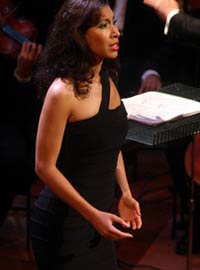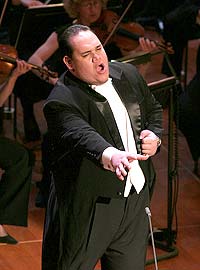|
Editor: Marc Bridle
Webmaster: Len Mullenger
|
Seen and Heard Concert
Review
The traditional 'silver medal' status of the Singer of the World competition's former Lieder Prize was polished up considerably this year. After renaming the competition for its 20th anniversary in 2003, as 'BBC Cardiff Singer of the World' (replacing its rather feeble transition from the original 'Cardiff Singer...' to 'BBC Singer of the World in Cardiff' ) the more or less equal status of recitalists and opera/concert singers became clearer this time. The Lieder Prize, also re-branded in 2003 as the Rosenblatt Recital Song Prize, gained the added prestige of its own final concert, broadcast by BBC Radio 3 on June 18th and to be televised by BBC 4 on July 16th.
Although three of the competitors in this concert will also appear as Main Prize finalists on Sunday, there is a very different line-up of voices for the two events. The Main Prize final offers two sopranos, one mezzo and two tenors while this concert fielded soprano, mezzo, tenor, baritone and bass voices, providing an almost unique opportunity to compare singers across the whole vocal compass.
Following her rapturous reception by the audience for Concert 3 in the Main Prize competition, it was fairly obvious that American soprano Nicole Cabell would win equal approval in this concert. She is a striking figure on stage: tall, slim and beautifully groomed (hers have been the most elegant 'frocks' by far in the whole contest, for those interested in such things) she also has a voice of superb power and flexibility. Her programme consisted of pair of songs by Ravel ( Cinq mélodies populaires grecques, Nos 1 and 2) two pieces by Obradors (Canciones clássicas españolas Vol 1 Nos 1and 6) and two items from Dvoràk (Gipsy Songs Op 55 No 4 , 'Als die alter Mutter,' and No 5 ' Reingestimmt die Salten.') The unusual Daybreak in Alabama by Ricky Ian Gordon completed her set, complementing the same composer's Dream Variations which she had sung in her Song Prize heat. The voice is certainly beautiful (faintly reminiscent of Renée Fleming sometimes ) and she can do almost anything she chooses with it. This is what gives her such extraordinary audience appeal, but what she lacks in recital, is an ability to engage the listener emotionally with the content of her material. I found myself listening to her sound rather than to the music a good deal of the time.
There was no such problem with Wendy Dawn Thompson however. Her programme was also varied (Schubert, Poulenc, Strauss and Bolcom) and she gave particularly engaging accounts of Strauss's wonderful Begegnung and Befreit (from the five Op 39 songs.) She had taken the considerable risk of choosing the Composer's aria Sein wir wieder gut from 'Ariadne auf Naxos' as the finale for her Main Prize round, but succeeded with it brilliantly and repeated that success again here. Although she seems to take a while to peak ( her Suleika from Schubert's Op. 14 songs and Sanglots, No 5 from Poulenc's 'Banalités' were less engaging) her firm and assured mezzo really shone in both Strauss arias and in Bolcom's Fur, with its ee cummings - like text (My Uncle Murray the furrier a big worrier but he's no hurrier now not today.) This was relaxed, confident and stylish singing in which effortless communication happened apparently naturally. The art that conceals art was definitely to the fore.
At long last though, we have a new English tenor in the Robert Tear tradition, who adapts stylistically to whatever he is singing. Already a Vilar Young Artist in 2003 and a BBC New Generation Artist with some recording experience and many engagements to his credit, Andrew Kennedy's Main Prize round comprised Mozart (Così), Tchaikovsky (Onegin), Berlioz (Béatrice et Bénédict) and Stravinsky (Rake's Progress) all delivered with relaxed commitment but also with appropriate power when needed. For this recital he produced Ständchen, (both Brahms and Schubert versions) Schumann's Mondnacht Liederkries Op 39, Ivor Gurney's Sleep from 'Five Elizabethan Songs,' some Duparc, some Fauré and the Strauss Schlagende herzen (Songs Op 9 No 2). Although this was less obviously tour de force singing than in the Main Prize round, it had the same charm, the same capacity to reach the heart of texts and the same.... well, strong yet graceful quality for want of a better word. Few performances come more balanced, more intelligent or straightforwardly musical than this.
Quinn Kelsey - Baritone (USA)
The competition rules now allow populations greater than 100 million to offer two competitors, so that the USA provided baritone Quinn Kelsey in addition to Nicole Cabell. He's a big chap, but bulk simply isn't everything and in his Main Prize round I found myself wondering if his voice was baritone at all, since he seemed much happier in its upper reaches. In this performance he sang Schumann's Die Beiden Grenadiere (Op 49, No1) Brahms Feldeinsamkeit, Vaughan Williams' The Vagabond, Percy Grainger's arrangement of Shallow Brown and yet another Bolcom piece, The Song of Black Max.
While the voice had more baritone fach this time, and indeed more raw heft, in all fairness this could not be described as great singing. Characterisation was generally fairly limited and while Black Max was great fun (it's a cabaret song) there were few moments when serious contention as a winner seemed particularly likely. He didn't win.
And neither did Mikhail Kolelishvili, despite being blessed with an absolutely enormous, dark and truly 'Russian' bass. Understandably enough, his programme was relentlessy Russian too (Tchaikovsky, Malashkin, Sviridov and Mussorgsky together with a piece by the Georgian Machavariani) because it's hard to think of anything else that he is better suited to sing. But sing he certainly can and he exudes tremendous but quiet confidence, presumably born out of the unusual assurance that there can be very few people in the world who can make the same kind of sound that he does. In the right repertoire, and as his voice develops further since he's still only 31, his prospects seem to be bright.
In the end, the prize went to Andrew Kennedy for his vocal technique, adaptability and keen intelligence, although Wendy Dawn Thompson made a good contender too. Along with Nicole Cabell both are in the Main Prize final on Sunday and in the event that none of them wins, Ms Cabell could well scoop the Audience Prize to judge by audience reaction at least. Each of these artists though, seem set fair for glittering careers.
Bill Kenny
Accompanists: Simon Lepper, Philip Thomas, Llyr Williams, Yana Zoubova
Judges: Elly Ameling, Helmut Deutsch, Marilyn Horne,
René Kollo
All photographs are by courtesy of the BBC.
Back to the Top Back to the Index Page |
| ||
|
||||







